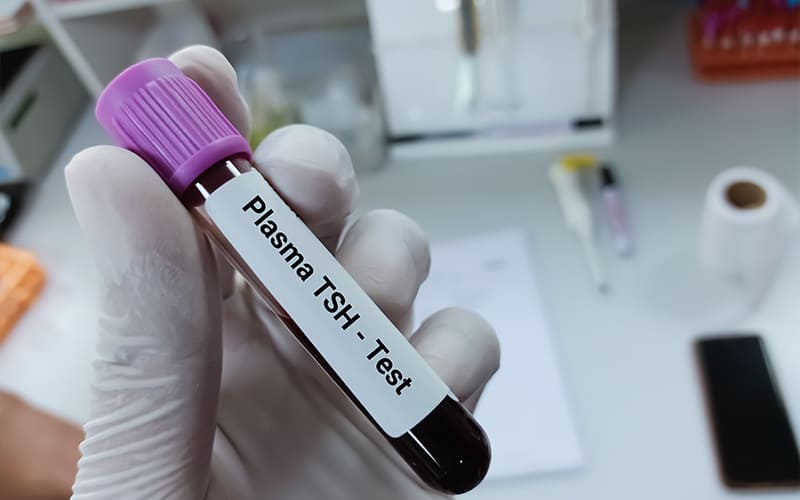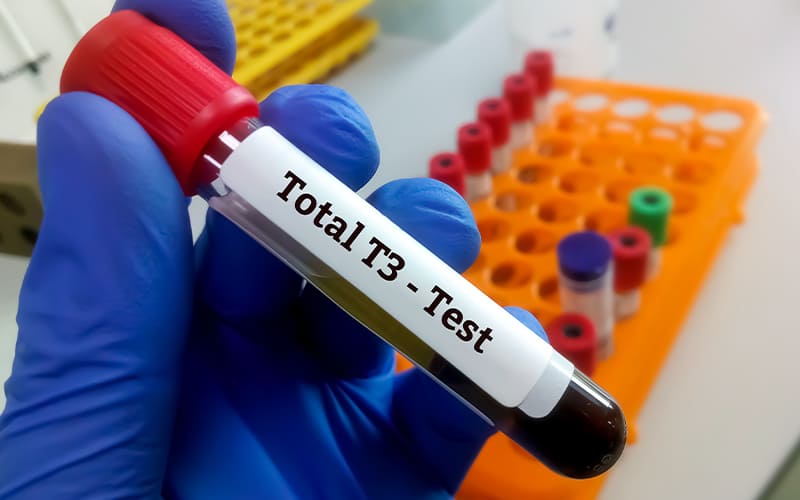In case you are showing symptoms of an improperly functioning thyroid, the doctor will recommend that you take a thyroid function blood test.
This blood test aims to discover the level of TSH, T4, and T3, in the bloodstream. In today’s blog, we will break down for you the thyroid function blood test and what it means. However, it is safer to get in touch with the best thyroid specialist in Kolkata for a complete analysis of the results.
So, without further ado, let’s explore the details of the thyroid function blood test and hypothyroidism.
According to the World Health Organisation, here is the definition of primary hyper-/hypo- thyroidism.
Primary hyper/hypo thyroidism is an elevated/decreased function of the thyroid gland which is not caused by an increased/decreased stimulation by TSH or TRH. Concentration of T4, T3 are typically elevated in the blood.
Secondary hyper/hypo-thyroidism occurs when there is increased or decreased stimulation of TSH.
Tertiary hypothyroidism is the decreased activity of the thyroid gland because of the decreased stimulatory function of the hypothalamus.
Subclinical hypothyroidism occurs when there is decreased thyroid hormone but elevated TSH in the blood.
What Are the Hormones Being Tested in a Thyroid Function Blood Test?
This particular blood test checks for the levels of TSH, T4, and T3. We shall explain the details of the same.
Thyroid Stimulating Hormone (TSH)
This hormone is produced in the pituitary gland, located at the base of the brain. This gland produces TSH (short for thyroid stimulating hormone). It regulates the amount of thyroxine or T4 that is produced by the thyroid gland.
Their action is a bit like a heater and a thermostat. If there are low amounts of T4 then the TSH will be secreted by the pituitary. Once T4 levels come up to normal, the pituitary stops secreting TSH.

In Blood Test:
- High TSH levels may indicate primary hypothyroidism.
- Low TSH levels indicate hyperthyroidism or a faulty pituitary gland.
- Normal TSH levels indicate a healthy thyroid.
Thyroxine or T4
This is the thyroid hormone that is secreted by the thyroid gland. It contains 4 iodine atoms hence the name T4. Get a consultation with the best thyroid specialist in Kolkata for more diagnosis.
In Blood Test:
- Total T4 measures the bound and free thyroxine hormone.
- Free T4 measures what is not bound and can enter the body tissues. Measuring this indicates how well a thyroid gland is functioning when you see it in context with the TSH hormone levels.
- Elevated TSH and low free T4 indicate hypothyroidism due to a problem with the thyroid gland.
- If both TSH and free T4 are low, there may be a problem with the pituitary gland.
- Low TSH and high free T4 indicate hyperthyroidism.
T3 Tests
The liver and certain other tissues convert the T4 hormone to T3 (triiodothyronine).

In Blood Test:
- This is measured to diagnose the level of severity of hyperthyroidism.
- T3 testing is not useful for hypothyroid patients.
- Free T3 and reverse T3 are also not helpful or clinically useful.
Euthyroid Sick Syndrome
It is also known as non-thyroidal illness syndrome and refers to changes in the thyroid function test when a patient is in an intensive care unit during episodes of critical illness.
In euthyroid sick syndrome, there is a low total T3 level and free T3 levels. However, free T4 and TSH levels are normal.
This is a condition that is often witnessed in those people who are suffering from critical illnesses, calorie deprivation, and post major surgeries.
When to Start Thyroxine T4 Replacement?
When the thyroid gland is not making sufficient levels of T4, it is necessary to start thyroxine replacement therapy. A lot of tests need to be undertaken before the therapy starts so that the correct dosage of thyroxine is determined by the healthcare provider. These tests will need to be undertaken regularly so that the levels of T4 are maintained carefully.
When there is a raised TSH level, is it always necessary to start replacement therapy? Not always, you need to consult with your doctor and let them take the call.
Also, you need to maintain regular visits with your doctor and they will inform you how frequently you need to come in for a check-up.
What is Subclinical Hypothyroidsim?
This is a case when the TSH levels are increased with normal T4 and T3. This condition is asymptomatic. There can also be several non-thyroidal factors which cause elevated TSH that need to be ruled out.
Presence of TPO antibodies (thyroid peroxidase antibodies) indicate an autoimmune etiology of hypothyroidism which should be measured at once. It may cause the progression of subclinical hypothyroidism to overt hypothyroidism.
